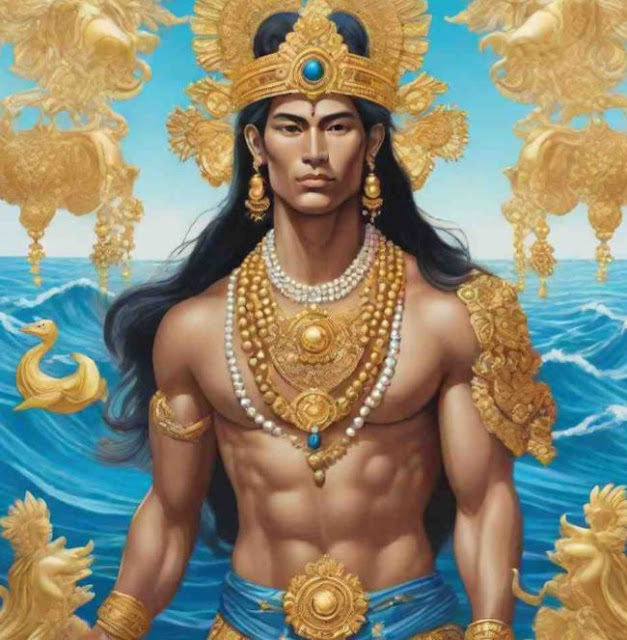MAGINDANG patron of fishermen god of the sea
Magindang is the deity of the ocean and patron of fishermen in Bicolano mythology
Magindang is the powerful god of the sea and ruler of all its creatures
His main domain was the ocean, and he is called the "God of the Sea"
usually depicted as a muscular male with wavy hair and a beard some stories depict him to be covered in precious pearls and his body decorated by elaborate tattoos made by sea urchin pins. He was venerated in Bicol fishermen and sea voyagers. He gives bountiful catch and safe passage to all who call to him. In contemporary Philippines, Magindang remains relatively obscure, and those familiar with him tend to perceive him as a minor water spirit rather than recognizing his true nature as a potent and commanding deity of the sea. Certain narratives depict him as a polygamous water spirit, persistently attempting to allure women and transforming them into mermaids, thus incorporating them into his assortment of mermaid wives.
 |
| Magindang effigy in Bicol |
Not only is Magidang prayed to for a bountiful catch he is also invoked for protection in the sea and from enemies. Stories tell the colonies and communities of Bicol were at constant fear of attacks and raids from the Visayan colonies. The sea is whats separates the Bicolanos from the vicious Visayans. The people would pray to Magindang and Onos to send tempest and storms so that the Visayan raiders would never reach their shores
 |
| MAGINDANG |
Magindang
“A clever and protective spirit or deity who is the patron of fisherman.” - Blumentritt’s Diccionario mitologico de Filipinas
“Magnindan was a beloved god of the Bicols, for did he not give them abundance of fish? He was the protector of the fishermen and it was to him that they prayed when there was little catch with either the nets or the lines. This was how their relation became closer and closer…
The villagers themselves put out to sea to make the necessary ceremony to call for more fish. They brought with them stones and shredded small fish that they had caught in the rivers. On reaching the designated spot for the ceremony, they pounded the sides of the casco on which they were riding and kept pounding throughout the whole sacrifice. The sound was made to call the attention of Magnindan. Then the other numbers of the party threw the shredded fish, and still others threw the stones into the sea. After that they were happy, for fish came abundantly again.
The Patron deity of Fishermen and God of the Sea:
Magindang's preeminence lies in his dominion over the ocean, earning him the title "God of the Sea" among the Bicolanos. As a deity of great influence, he holds sway over the myriad creatures that inhabit the depths, commanding their respect and allegiance. This affiliation establishes Magindang as a pivotal figure in Bicolano folklore, particularly in the lives of fishermen and sea voyagers who depend on the sea for their livelihoods.
 |
| MAGINDANG |
 |
| MAGINDANG |
Magindang and the Buwaya
The Buwaya were mythological creatures in Philippines. Prevalent in the Visayas and Bicol. The heroes of Ibalong has almost exterminated most of the land beast and monsters but not those who dwell in the waters. The Bikolanos believed they were a race of all male monstrous creatures that dwell in the waters.They needed human women to procreate. They were vicious and fierce, they infested the waters of Ibalong. They were fierce and could change their appeance, sometimes they would take the form of what seems like small patches of land in the water. Sometimes they would take the form of huge crocodiles. But when ever they walk on land they walk on two foot, extrmely tall muscular men with ugly faces and skin with scales that spears can't penetrate and teeth razor sharp. The people of Ibalong were alarmed so they prayed to the lord Magindang. They also threw offerings in the water, flowers and prayer. Magindang answered their prayers. Magindang appeared as many water spouts and manifested himself to the Buwaya, Magindang told them not to harm the people of Ibalong, The horde of Buwaya agreed. For they also promised the lunar god Bulan the same thing. Since then the Buwaya horde would only pass by and left the people of Ibalong at peace
 |
| Magindang |
REMINDER
The orally transmitted mythology of the Philippines is intended for sharing and understanding, not for appropriation, commercial exploitation, or the promotion of foreigners and foreign products. It is a dynamic narrative tradition that evolves over time, distinct from the standardized mythologies found in Western and European cultures. Unlike these established mythologies, the Philippine government has not mandated standardized versions of stories and legends.
Orally transmitted stories undergo variations and evolve over time, resulting in numerous different versions. There are many different version told by Filipinos,and retold by Filipinos.
.jpeg)










.jpeg)
.jpeg)
.jpeg)
.jpeg)
No comments:
Post a Comment
Note: Only a member of this blog may post a comment.